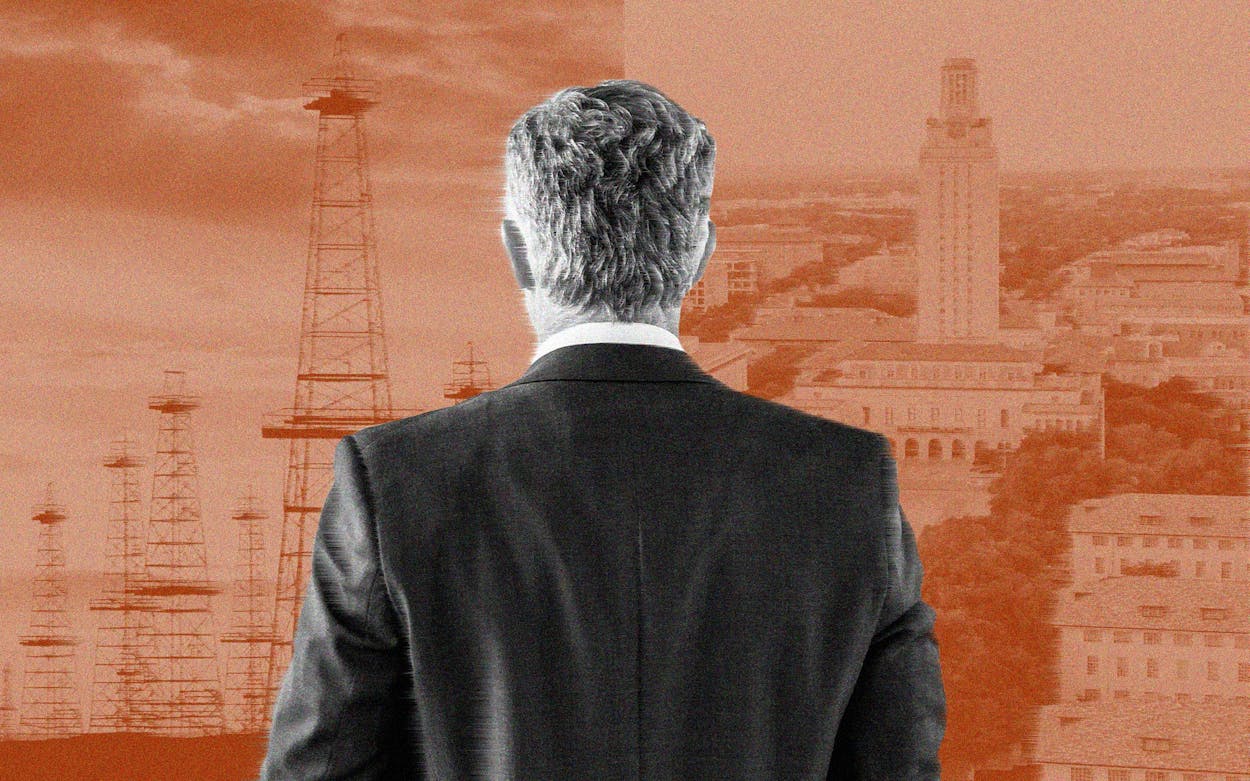Ben “Bud” Brigham once drove an Audi SUV adorned with a “Who is John Galt?” bumper sticker. The more pertinent question may be: Who is Bud Brigham? The geophysicist turned oil executive is the driving force behind the planned creation of a think tank at the University of Texas at Austin focused on the promotion of individual liberty, free markets, and limited government. He also expresses a passion for the libertarian political philosophy of the writer Ayn Rand, which explains the bumper sticker echoing one of the most famous lines from her novels.
The “Liberty Institute” recently received $6 million in seed funding in the state budget for the coming fiscal year, raising its profile considerably—and raising questions about Brigham, who sources at UT say has been pushing for such a think tank for several years. Others known to be involved include UT alum Bob Rowling and Lieutenant Governor Dan Patrick. Rowling, founder of a Dallas holding company that owns Omni Hotels, said through his assistant that Brigham was “the leader of the effort.”
It’s unclear exactly how the Liberty Institute will be fully funded, though one possible scenario, according to the Texas Tribune, would have the state and UT committing to $75 million, while private donors such as Brigham would kick in another $25 million. The think tank appears to be designed as a counterweight to what many conservatives see as a leftward lurch of the intellectual orientation in academia, and it bears some resemblance to the conservative Hoover Institution at Stanford University.
This summer, after learning that the state government would allocate tax money for the Liberty Institute, a coalition of student organizations responded that the money could be better used elsewhere. “UT students need tangible support and resources, not more funding towards ideological-driven donor passion projects,” they wrote in an open letter.
Brigham, who declined an interview for this story, has expressed sharp criticisms of higher education in general and climate science in particular. On August 19, Congressman Chip Roy, a Republican who represents much of the Hill Country and parts of San Antonio and Austin, tweeted “Stop funding universities.” Brigham liked Roy’s tweet. When I interviewed Brigham in 2012, he blasted academic researchers for their role in what he described as a “global warming scam,” claiming that they exaggerated evidence in the scientific literature that humans are to blame for climate change because they’re rewarded with research grants for doing so.
Brigham told me he believed findings that human activity has significantly contributed to a marked rise in average global temperatures are a “stretch,” despite the overwhelming consensus among scientists to the contrary. He added that it would be dangerous to “legislate away prosperity” by changing tax incentives, which now heavily favor fossil fuels, in a bid to curb greenhouse gas emissions. In 2012, he gave $10,000 to a Houston-based group called Plants Need CO2, a short-lived nonprofit run by a former oil executive that ran a media campaign to educate the public on “both the negative and positive effects of CO2,” according to its tax filing.
Brigham, who lives in Austin, played a key role in the domestic oil boom of the past decade. His eponymous company, Brigham Exploration, helped figure out how to use fracking techniques previously used to target natural gas to extract oil as well. This helped turn North Dakota into an OPEC-size oil producer and spurred the renaissance of the Permian Basin in West Texas.
Born in Midland, Brigham founded Brigham Exploration in 1990 and took it public in 1997. Oil prices were then low, and the industry was in the doldrums. Yet it turned out to be a good time to invest in the future of domestic fossil fuels. The development of fracking—the hydraulic fracturing of underground rock to release natural gas or oil—was about to make many oilmen quite wealthy. Brigham was shrewd enough to number among them. He helped steer Brigham Exploration to drill what was the first modern, horizontal well in North Dakota’s Bakken Shale rock formation.
Again and again during that hourlong 2012 interview, he made sure to credit the company’s team that designed and executed its wells. He attributed his success to creating an atmosphere that encouraged employees to be entrepreneurial. “It’s the innovators that are successful,” he said. Employees need to be “willing to take the risk and to innovate and be willing to risk failure.”
Brigham sold Brigham Exploration to Norway’s Statoil, now known as Equinor, in 2011 for $4.5 billion. He built a second company, Brigham Resources, which he sold for $2.55 billion in 2017 to Diamondback Energy. He is now the executive chairman of Brigham Minerals Inc., a publicly traded company worth $1.1 billion that purchases mineral and royalty interests, and is chairman of Atlas Sand, a privately held firm that mines and sells sand used in fracking operations.
His family foundation has given generously to the conservative Texas Public Policy Foundation, as well as a number of Texas-based charities. In 2015, Brigham’s foundation gave $172,500 to the Ayn Rand Institute: The Center for the Advancement of Objectivism, to provide books to Texas teachers.
Not long after selling his first company, he helped fund and was credited as an executive producer on two of three movies in a trilogy that adapted Ayn Rand’s 1957 novel, Atlas Shrugged, for the screen. The 1,200-page book features capitalist captains of industry facing off against a government bent on total economic and social control. One of its protagonists is John Galt, who leads the industrial tycoons on a strike against the government. The novel’s catchphrase “Who is John Galt” has appeared on bumper stickers and Lululemon shopping bags. Later, Brigham backed a film, My All-American, about former Texas Longhorns football player Freddie Steinmark and the team’s 1969 championship season.
Brigham is active in Republican politics. Since 1998, he’s given $827,232 in contributions to candidates, parties, and political action committees, according to the Center for Responsive Politics. All but one contribution went to Republicans and right-wing affiliated groups, including $200,000 to Governor Greg Abbott, $50,500 to Railroad Commission chairman Christi Craddick, and $33,712 to Senator Ted Cruz. The one exception? He gave $300 to Barack Obama in 2012.
In August, a University of Texas System vice chancellor said the system would match the state’s $6 million appropriation and told a meeting of the Board of Regents that “an additional match is expected from private philanthropy.”
It seems that Brigham’s dream of a Liberty Institute on the Forty Acres is close to realization.
- More About:
- Politics & Policy
- Business
- Austin








